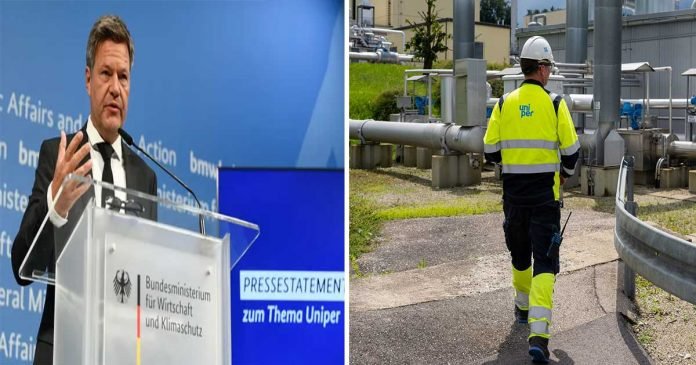Germany has agreed to nationalise its biggest gas importer, Uniper.
The German government will acquire a 99% stake in the ailing gas importer Uniper, as Russia’s gas supply freeze threatened to drive the company into bankruptcy.
On Wednesday, Finnish state-owned energy company Fortum, the former majority shareholder of Uniper, announced it had signed an agreement in principle that will be finalised following the completion of a capital investment and the acquisition of Uniper shares by the German government.
The nationalisation of Uniper, once created as a bad bank to concentrate fossil assets of E.ON, follows repeated attempts by the German government to keep it going.
Bleeding tens to hundreds of millions of euros per day as contracted gas flows from Russia stopped coming, Berlin offered credit lines and created a gas levy to mutualise the costs of keeping business running. Now, the government is undertaking the country’s largest ever nationalisation.
The German Economy Ministry confirmed that the government is taking a 99% share of Uniper, creating a “clear ownership structure in order to secure Uniper and thus the energy supply for companies, municipal utilities and consumers.”
It added that the acquisition of the shares will be completed after the fulfilment of various regulatory requirements, along with approval at Uniper’s general assembly meeting and approval from the European Commission.
It is legal to nationalise failing industries in the EU for the short term, however, questions on the use of state aid could be raised.
The deal builds on a rescue package agreed in July, when Berlin took a 30% stake in the company and includes a capital injection of €8bn (about £7bn) of government money.
Uniper had been controlled by the Finnish state-owned energy company Fortum, which welcomed the announcement. It said Berlin would buy its shares for €500m, giving the state a 98.5% stake in the gas company.
Germany’s winter gas woes
Europe is reliant on gas to heat homes, and to generate electricity to power factories, raising fears of business closures, rationing and a recession as the weather turns cold.
Countries across the continent have scrambled to counter soaring gas and electricity prices, to help households and businesses, and to secure their energy supplies for winter, including by filling their natural gas storage.
A winter approaches, Germany is doing all it can to save natural gas. Estimates are that storage tanks are currently 90% full.
Germany’s economy minister, Robert Habeck, has expressed optimism that the country will make it through.
“As a whole, we have coped quite well with the situation,” said Habeck told reporters in Berlin Wednesday.
“But for Uniper, the situation become has significantly more dramatic and significantly worse,” he added,
Habeck said that a gas surcharge will go into effect as planned on October 1.
In August, the amount of the planned levy was announced at 2.4 euro cents per kilowatt hour.
Habeck said Wednesday that the surcharge is necessary to ensure the financial integrity of Uniper, and Germany’s other energy providers.
“The state will…do everything necessary to keep companies stable on the market at all times,” Habeck said, adding that the gas levy was a mechanism allowing companies to pass on higher costs in advance.
However, now that Uniper is a state-owned company, there are questions as to whether it is the levy will be in accordance with German law. Habeck said that legal analysis is ongoing.
The ailing energy importer has been burning through cash reserves sourcing gas on the expensive spot market.
Last week, Germany also took control of three Russian-owned oil refineries before an embargo on Russian oil takes effect next year.
wmr/kb (dpa, Reuters, AFP)
Support Independent Journalism Today
Our unwavering dedication is to provide you with unbiased news, diverse perspectives, and insightful opinions. We're on a mission to ensure that those in positions of power are held accountable for their actions, but we can't do it alone. Labour Heartlands is primarily funded by me, Paul Knaggs, and by the generous contributions of readers like you. Your donations keep us going and help us uphold the principles of independent journalism. Join us in our quest for truth, transparency, and accountability – donate today and be a part of our mission!
Like everyone else, we're facing challenges, and we need your help to stay online and continue providing crucial journalism. Every contribution, no matter how small, goes a long way in helping us thrive. By becoming one of our donors, you become a vital part of our mission to uncover the truth and uphold the values of democracy.
While we maintain our independence from political affiliations, we stand united against corruption, injustice, and the erosion of free speech, truth, and democracy. We believe in the power of accurate information in a democracy, and we consider facts non-negotiable.
Your support, no matter the amount, can make a significant impact. Together, we can make a difference and continue our journey toward a more informed and just society.
Thank you for supporting Labour Heartlands












